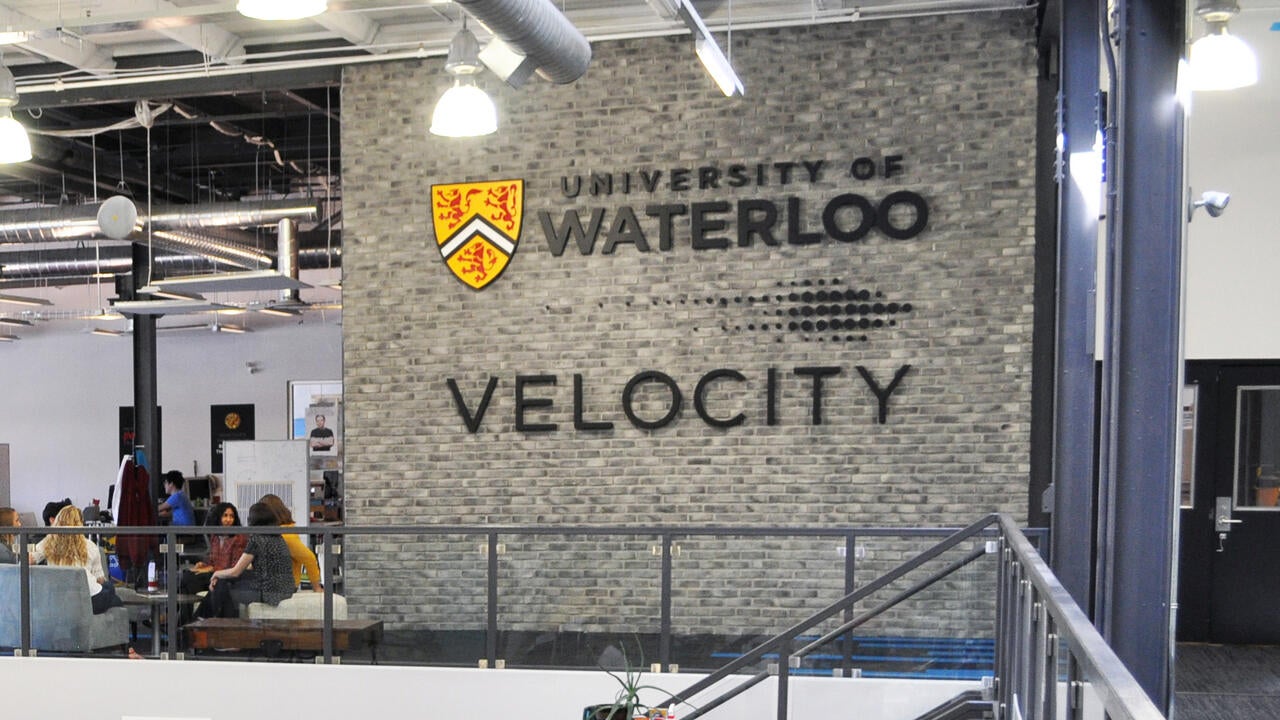
Doubling down on Waterloo startups
Velocity helps entrepreneurs weather the economic storm during COVID-19

Velocity helps entrepreneurs weather the economic storm during COVID-19
By Stephanie Longeway University RelationsThe devastation of the COVID-19 pandemic has been felt around the world, claiming lives and putting societies on lockdown. This health crisis quickly turned into an economic crisis as businesses closed and markets tanked, leading many to declare that Canada is officially in a recession.
Early reports are showing some of the hardest-hit businesses are startups. A new survey of global startups ecosystems by Startup Genome found that about three-quarters of these young businesses have had to let go of full-time staff and that 41 per cent of startups globally are considered to be in danger of collapse with less than three months of cash runway left. And the prospects of getting more financing are bleak, with nearly 20 per cent of startups having term sheets pulled by the investor since the pandemic, and 53 per cent have seen slowed progress or are dealing with unresponsive investors.
However, the forecast at Velocity, Waterloo’s entrepreneurship incubator, is looking much brighter.
“Velocity has some of the world’s best founders, and that has never been more apparent than it is now,” says John Cappuccitti, director of Velocity Incubator. “The resilience and grit of our teams are what motivates Velocity to double down on its investment activities and continue to fund the next generation of great companies during this challenging time.”
Many Waterloo startups have taken this economic crisis as an opportunity to reinvent their business strategy or strengthen it using lessons learned. Currently, 10 percent of Velocity startups have expanded or pivoted their focus to COVID-19.
This is a good early sign for Waterloo region and Canada’s economy. A 2019 Deloitte report found that Velocity and their spin-off companies generated $1 billion in revenue over the past decade and created more than 4,000 jobs. Ensuring the continued health of these growing businesses is crucial to our nation’s economic recovery.
Theraphage originally joined Velocity Incubator as a cancer therapeutics company with solutions for personalized treatment for solid cancer tumours. In early March, they responded to the global outbreak and partnered with researchers from the University of Waterloo to develop a COVID-19 therapeutic vaccine that can be administered intranasally. The vaccine, termed “synthetic infection” or “synfection” mimics the route of actual infection, but cannot propagate — making it safe for humans. The company is very confident that this vaccine has great potential in the fight against COVID-19 and is working to expedite its progress.
In total, eleven companies at Velocity are now working on innovative solutions to combat the COVID-19 pandemic, including three new ventures not previously supported by Velocity.
But it is not just COVID-19 related businesses finding success during this crisis, other businesses are weathering the downturn thanks to new resources and Velocity’s unique approach to offering individualized support tailored to the needs of each company.
“What’s allowed us to be better in our approach to supporting startups hasn’t changed, it’s how we have always approached supporting founders, and why we have always had a higher survival rate,” says Adrien Côté, executive director of Velocity.
Velocity is Canada’s most productive incubator and has a three-year survival rate of 69 per cent. Côté points to their ability to customize support for businesses in their incubator program as well as the unique tiered approach to prepare entrepreneurs. Velocity’s Concept program allows Waterloo students to test their business ideas and develop the entrepreneurial skills they need to be successful before they even enter the incubation stage.
“Concept enables entrepreneurially-curious students to build and expand on their ideas,” says Camelia Nunez, director of Concept. “We offer coaching, workshops, pitch preparation sessions and grant funding to give students with big ideas the skills and experience needed to start a business. So, when they enter the Velocity incubator, they’re ready to hit the ground running.”
The pandemic has put a stop to these in-person coaching sessions, but Concept has quickly responded in moving all their services online and organizing a new cohort called “The Pandemic Challenge.”
“In the face of this global crisis, the entrepreneurial community at UWaterloo has come together in an effort to help students tackle the massive problems of a global pandemic,” Nunez says. “We aim to support students in turning their ideas into solutions with real impact that could materialize as startups, social ventures or influence policy.”
The Velocity incubator is currently home to more than 80 startups who all receive support tailored to their business needs, including one-on-one mentorship and unique funding opportunities. Velocity’s approach to hosting startups at the Incubator is unique. Initially, no fees are charged to startups, this helps facilitate rapid generation of momentum for new entrants to the program. Crucial cash flows can be entirely directed toward business and product development.
“Companies that traditionally would be slow or perhaps not even able to create initial momentum can get started and move faster,” Côté says. “One third of Velocity companies are working in health tech — building companies that can create strong economic returns and benefits to the health care system, but takes more time because clinical and regulatory processes are engaged on route to launching a product. We give them that time.”
Velocity’s Incubator is a competitive program to get into, and last round, only 12 per cent of the more than 80 applications were accepted.
“We only accept the highest performing entrepreneurs,” Côté says. “We bet on the startups most likely to land successfully because we want our investors to see a strong return and we want the Canadian economy to see a strong return.”
Canadian policymakers have been working around the clock to support the economy during the COVID-19 pandemic and have already launched several programs, but there is still much more to be done to pull us out of this recession.
“These entrepreneurs will lead the next wave of ventures entering a changed economy. But they are informed by the crisis, not just reacting to it, and stand to be equipped and positioned to win now and as the pandemic eases. By engaging a spectrum of future and current entrepreneurs, Velocity and Waterloo are pistons in the engine of recovery.”
Entrepreneurs are adept at being agile and focused in the face of disruption, and resiliency is their competitive advantage during this crisis. Velocity is looking to amplify this advantage and support startups to land successfully in the next era of the economy.
Velocity is University of Waterloo’s leading entrepreneurship program. Its composed of two units. The Velocity Incubator supports early-stage tech companies through to the seed stage and provides customized business advisement and product development facilities. Concept, by Velocity infuses the Waterloo community with inspiration and information about entrepreneurship and operates pre-incubation programs to ready soon-to-be entrepreneurs for building a company.

Read more
Supporting teachers and parents during COVID-19 and beyond

Read more
Researchers at the University of Waterloo are developing a DNA-based vaccine that can be delivered through a nasal spray.

Read more
Engineering students are looking for help from academics and industry to refine and produce their low-cost, portable ventilator
The University of Waterloo acknowledges that much of our work takes place on the traditional territory of the Neutral, Anishinaabeg, and Haudenosaunee peoples. Our main campus is situated on the Haldimand Tract, the land granted to the Six Nations that includes six miles on each side of the Grand River. Our active work toward reconciliation takes place across our campuses through research, learning, teaching, and community building, and is co-ordinated within the Office of Indigenous Relations.